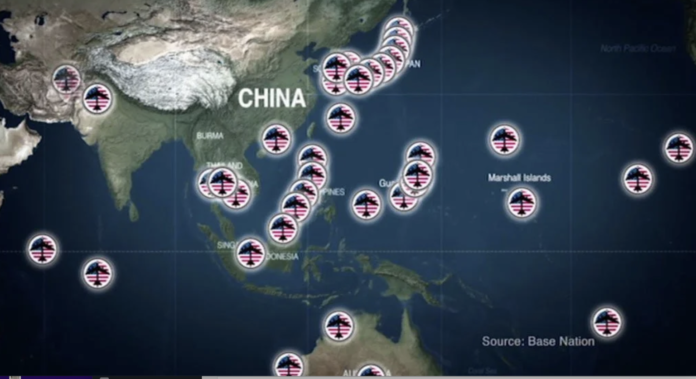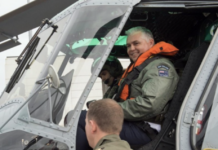Australia – US to sponsor undersea data cables in the South West Pacific
Australia and the US will soon contribute $ USD 65 million towards laying new digital data cables between; Papua New Guinea, Solomon Islands, Kiribati, Timor-Leste, Tuvalu, Vanuatu and the Marshall Islands.
This investment is going to support an existing Google project to provide better internet connectivity in this region. The project is reported to include American support for cyber-security to countries in the region.
This deal is partly about providing economic aid to the region, and it will significantly improve internet connectivity. However, the project certainly has security implications. Australian general, Mick Ryan often discusses how the war in Ukraine demonstrates a complete integration of the civil and military information space. Essentially, that digital networks are now so connected that there is a constant flow of timely information from smart phones everywhere to open-source internet sites. This means that any military needs to contend with operating under almost constant observation and can often get better information, quicker about its enemy from the internet than from conventional military intelligence activities.
Additionally, this creates an ‘information domain’ or public discussion that militaries need to influence, and can exploit. Controlling or denying internet infra-structure, like cables to an enemy is a new aspect in war-fighting. Currently, NATO navies are on high-alert patrolling the North Sea to protect undersea infra-structure including internet cables.
By financing these cables Australia and the US are ensuring that an American company controls a local digital network. A network that can be used to compete in the information domain, propagandising in peacetime and allowing a flow of Open-Source Intelligence (OSINT) during conflict. A very useful resource, and the project is an example of Austro-American ‘soft-power’ in action, supporting infrastructure that provides local people with economic benefits but that is also useful for wider diplomatic and military reasons.
Indonesia cracks down on extremist groups before elections
Indonesian counter terrorist police arrested 59 people from extremist groups last week, confiscating weapons, chemicals used to make explosives and propaganda. Nineteen of those arrested were members of Jemaah Islamiyah, an Islamic extremist group with ties to Al-Qaeda that is best known for the 2002 Bali Bombing that killed 202 people. The remaining 40 were from another Islamic extremist group, Jamaah Ansharut Daulah that has links with ISIS.
Indonesia, is a large and important nation in the Pacific region its roughly 17,000 islands linking Australia and Melanesia with South-East Asia. Indonesia is the world’s largest Muslim nation and although criticised over a variety of human rights issues, is a generally tolerant and cosmopolitan nation. However, these arrests remind us that Islamic extremism is still a feature of this region’s political and social landscape. Sometimes breaking into armed conflict both in Indonesia and in the Philippines.
The country is a traditional political fault line and historically had to find a balance between the West and the Soviet Union. Today the West’s counter pole is China, and in the evolving multi-polar world Indonesia’s diplomatic environment is becoming more complex. Therefore, Indonesian politics can sometimes opaque and it pays to try and figure out the motivation for these public arrests. What message is the Indonesian government trying to send?
This activity is a reminder that although Ukraine and Gaza are currently dominating international headlines, Islamic extremist groups remain active in the Pacific region. Some are highly capable and well-organised with the ability to transition into larger political movements. Indonesia appears to be sending the message that this type of activity is being monitored.
Pacific Islands Forum annual leaders meeting this week
Pacific leaders are descending on Rarotonga for the Pacific Island Forum’s 52nd annual leaders meeting. The meeting is happening within the context of increased Sino-American competition, both superpowers working hard to win support from small Pacific Island nations.
This year’s forum is marked by the absence of three Melanesian nation’s leaders Papua New Guinea, Vanuatu and Solomon Islands. Papua New Guinea’s Prime Minister, James Marape has not yet commented on his absence. Solomon Islands is sending a delegation but Prime Minister, Manasse Sogavare is remaining home because he is the minister responsible for the upcoming Pacific Island Games. Vanuatu’s Prime Minister, Charlot Salwai said that his priority is leading recovery from Cyclone Lola.
We need to be cautious about reading too much into the absence of these leaders, but it should be noted and considered. Pacific nations are managing a period of increasing political tension and the Pacific Island Forum provides an opportunity to work together to demonstrate a unified ‘Pacific position.’ By working together Pacific nations have more influence, so it is concerning when three important Pacific nations are not at the forum.
Discussion this year focuses on economic development both to increase the wealth of local communities but also to provide the revenue required to develop infrastructure, especially infra-structure that is more resilient to the impact of climate change.
The Asian Infrastructure Investment Bank, China’s competitor for the International Monetary Fund has recently been active in the region and its ‘pitch’ to local nations is likely to be a topic of discussion. The Pacific region’s nations desperately need to develop more and better ports, roads, railways, airports, oil and gas pipelines and communication networks to increase their economic capacity. It is likely that in the next few months there will be something of a bidding war US and its allies competing with China to fund infrastructure projects in the region. This could be a fantastic opportunity for Pacific nations or could lead to generations of debt depending on how careful Pacific governments are negotiating.
Deep sea mining
In July, the Pacific Brief discussed the legalisation of deep-sea mining and its potential impact on the Pacific, quoting expert Guy Standing who described this change in the Guardian as “The biggest gold rush in history.” Already Narau, Tonga, Kiribati and Cook Islands are sponsoring mining applications and issuing exploration licences. However, there is growing opposition internationally and in the Pacific. Twenty-three countries including Fiji, Samoa and Palau are calling for a pause on deep-sea mining and others like Narau and Cook Islands opposing any pause or ban.
In 1982, the United Nations passed the United Nations Convention on the Law of the Sea (UNCLOS) that ratified every nation’s right to an exclusive economic zone; and declared that the deep sea was a protected area that is “the common heritage of mankind.” This position banned open ocean mining until a code was developed.
The United Nations set up an International Seabed Authority in 1994, that spent the last 28 years trying to reach consensus on how to administer seabed mining. In 2021, the situation changed when Nauru and a mining company invoked a clause in UNCLOS that if a country wishes to mine under the sea the International Seabed Authority has exactly two years to regulate the industry; or mining can happen anyway. This deadline expired in to July 2023 creating the current situation.
This issue has the potential to create considerable conflict between Pacific nations. Some are poor and deep-sea mining may improve economic prosperity. However, historically exploitation of natural resources in less well-governed nations tends to see poor outcomes for the host nation and its people. Managing the issue of deep-sea mining in the Pacific is very difficult political and diplomatic issue also has security implications because high profits may incentivise corrupting officials or the use of violence.
Melanesian update
A regular update on the Pacific’s least reported trouble spot; Melanesia.
Papua New Guinea runs out of money to host Australian refugees
In recent months, Papua New Guinea has been pressing Australia to reimburse it for the cost of managing a group of refugees held in the nation. Australia’s policy of detaining illegal immigrants off-shore is opposed by many Pacific nations but has a long history. Papua New Guinea was paid to detain people illegally trying to enter Australia but as political opposition to the practice has grown the nation is keen to stop it. The nations are now embroiled in a political debate about how the costs should be shared.
Unfortunately, a group of 64 people are caught between the two countries. Recently, Papua New Guinea has taken steps to either accept the refugees or get them access to other countries, New Zealand is already planning to accept 40.
This situation demonstrates some of the significant political tensions in the Pacific. Australia is struggling with illegal immigration. Papua New Guinea and other Pacific nations have benefited economically from holding refugees, but when political opinion changes Australia may be better to acknowledge local opinion and work with Papua New Guinea’s government to resolve the issue. Otherwise, Australia risks creating a conflict exploitable by propagandists, that can use situations like this to portray the nation negatively.
Papua New Guinea struggle to pay United Nation’s rent and charges
It costs money to belong to the United Nations and Papua New Guinea has fallen behind on rent for its offices and a range of other fees. This situation is being resolved and it is another demonstration of the difficulties associated with weak government institutions in the nation.
Ben Morgan is a bored Gen Xer and TDBs military blogger





I can’t see how those people being in PNG are in anyway “Australian” refugees.
And it’s a very strange framing that action should be taken, this way or that to avoid “creating a conflict exploitable by propagandists, that can use situations like this to portray the nation negatively”.
If a story is true then it isn’t propaganda. If the negative story isn’t true, then it can be refuted without any change in policy. the idea that policies are good or bad due to good or bad “optics” is cynical and insidious. There is a major difference between working hard in order to look like you are doing the right thing and actually doing the right thing.
The goal is nothing, movement is everything…..comes to mind.
“The Asian Infrastructure Investment Bank, China’s competitor for the International Monetary Fund has recently been active in the region and its ‘pitch’ to local nations is likely to be a topic of discussion.”
Well I’d like to be a fly on the wall .Pretty sure John Key signed us up to that in 2015
Silence is violence
https://twitter.com/5Pillarsuk/status/1722564050154840439